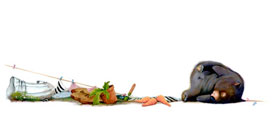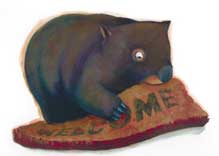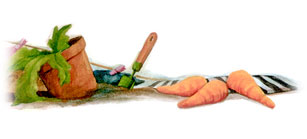Intro | Books for Kids in Need
Mine News | Recent Awards
New Books | Schedule for 2012 and December 2011
The January Garden
Cool, Cold Recipes:
. Salmon and Cucumber Mousse
. Curried Egg Salad
. Strange but True Coleslaw
. Fruit Slushie
Is there anyone who ever admits that Christmas isn’t perfect? Okay, there are the grouches who give graphic accounts of Uncles Steve and Bernie’s stoush among the backyard petunias and the slur that there is only one Christmas cake in the world that is passed around uneaten from year to year (I think one of my favourite authors, Lionel Trilling, came up with that idea first).
But what of those who felt that it wasn’t quite, well, Christmas this year?
I don’t think it was just us, nor trying to work at light speed and failing for the last six months of 2011 so that Christmas arrived like a superfast train, silently and about to dash away before we knew it was there. Our town didn’t have a Christmas tree in the park this year, and there were so few Christmas decorations the annual fund-raising tour of them was stopped. Maybe there was a general feeling of unease about the world and the many, many meanings that Christmas can have just got slightly buried.
But it was a good Christmas. Not a grand and glorious one, but still one to keep in the cupboard of the mind, cutting the Christmas cake and finding it the best ever, getting what were some of the most perfect gifts, the ones given by those who not only love but know you (how did they manage to find those DVDs and books when I hunt through all the new releases and never even noticed them? Am still deep in the post-Christmas pleasure as I write this).
Mooching with Noel and Geoff and Fabia and Bryan around gardens and the fringes of Canberra, as dusk slowly feathered in and we tried to make room for more of Noel’s best pudding in the universes. Just sitting and talking with family who live too far away to see every week or even month, and while email and phone is good it’s not the same.
Yes, it was good. And maybe Christmas shouldn’t be given a ‘one to ten’ report card, but just loved.
Wombat News
I read Christmas Wombat to Mothball. She was interested, but only till she found she couldn’t eat it.
Wombats don’t do Christmas. They didn’t even appear at Christmas, fat on grass and with no interest in humans, which was why writing Christmas Wombat was so much fun. This is a book about an animal who had no idea about the true meaning of Christmas.
Mothball has decided to appear a couple of times a week since, mostly to use the front door as a scratching post. I think the wombats are a bit stunned by so much green grass, grass that just keeps growing. So many babies this year, round and brown and bouncy. Even Mothball can’t be bothered to be grumpy.
What I have learned this month:
. check that the garden hose is not a dozing brown snake before you try to pick it up (luckily the snake had better reflexes than me, and vanished);
. marzipan wombats will be eaten, even if you put up a sign saying ‘do not eat the wombats’ on the lid of the Christmas cake;
. all that is labelled ‘food’ by airlines is not necessarily edible (I did know that one before, but that slice of eggplant on my ‘vegan sandwich’ had mould on it. Or maybe they thought the mould added extra vitamins?).
Books for Kids
Kids do it hard when there natural disasters. Adults know that life can get better. Sometimes kids don’t.
If there is any child you know of who has faced natural disaster this year and might be cheered by a book could you let me know on jackiefrench72@gmail.com. The supply of books may be depleted if there are a lot of replies, but I’ll do what I can. (Please don’t keep the email address for email chatting though – I can’t quite keep up with email questions as it is.)
The Mine
This February the NSW Land and Environment Court will hear a challenge to approval conditions for the Dargues Reef gold mine, planned for four kilometres upstream of us, with 800,000 cubic metres of tailings dam and tunnels that will run far deeper than our valley. The challenge is to try to have safer conditions for mining and processing the ore, including all the conditions that the Department of Water initially wanted.
This land is the home of Mothball wombat, of Diary of a Wombat. It is also the land I have walked and loved and written about for nearly forty years.
This is just one of so many similar cases around Australia. But if we can win stricter conditions – including independent monitoring and the necessity for baseline studies before development begins – it will be an important precedent that may help others who fight these battles too.
Donations should be made to Araluen Valley Producers and Protectors of the Ecosystems Coalition (AVPPEC) Inc.
Mail: PO Box 63, Braidwood, NSW, 2622.
Or direct deposit to: Bendigo Bank BSB: 633000 Acct No: 144327145 (for bank transfers).
Recent Awards
Hazel Edwards and I are among the 184 candidates from 60 countries nominated for the Astrid Lindgren Award, which will be announced in March. The Award is given for an author’s body of work and contribution to children’s literature generally, not for one specific book. It is an honour and privilege to be among the nominees.
Book News
Have been writing, am writing, will be writing… the next couple of weeks will be rewriting another novel for adults, an historical one. I’m dreaming of a few uninterrupted days to keep my mind at grips with it, but probably won’t get them. Have also just done the final revision for Pennies for Hitler, the companion volume, rather than the sequel, to Hitler’s Daughter, and Dingo, the story of a bony boy, a rubbish dog and Australia’s first dingo from whom possibly all other dingos are descended.
Christmas Wombat seemed to vanish from the shops the week after it hit the bestseller list, which I hope means that they have all sold. I’m not sure how soon it’ll be reprinted, but I’m sure it’ll be well in time for next Christmas.
The last novel to hit the book shelves was Nanberry: Black Brother White – the story of four extraordinary people in the early NSW colony: Surgeon White, who hated Australia, loved a convict girl, a loyal father not just to his white son but to the black one he adopted; Rachel, who escaped the gallows to become the richest, most loved woman in NSW; Andrew, their son, who became a hero of the Battle of Waterloo, finally coming back to Australia; and Nanberry, orphaned by the smallpox, who would stride between the white world and the black, as a sailor in the Merchant Navy and a Cadigal warrior and leader of his people.
It’s as accurate as I can make it, two hundred years after it all happened. But it did. They were heroes, incredible and they need to be remembered.
Other books: A Waltz for Matilda (perhaps my favourite book) came out about eighteen months ago, as did A Year in the Valley, a book (for adults) about life here with the wombats and the trees and garden and friends. Queen Victoria’s Underpants is the (almost) true story of how Her Majesty’s underpants led to freedom for women.
The revised Chook Book is in the shops too now – twice as big as the original edition and much changed and updated. It’s all you ever wanted to know (and probably a bit more) about how to keep chooks in your backyard or at school.
Coming soon: A Day to Remember, created with Mark Wilson
Schedule for the Year to Come
This is what the calendar has so far, but there are already another half dozen trips pencilled in, as well as many other commitments. There are always last minute things I have to do, too. It’s unlikely I can add in more school, library or community talks in 2012, unless they are near to somewhere I’ll be already. I’ll also be ACT Library Ambassador for the 2012 Year of Reading.
February 1-15: Appeal against the Dargues Reef Mine in the NSW Land and Environment Court
February 25: Keynote speaker and workshops at the annual conference of the SA SOSE Council (SOSE – Studies of Society and Environment) teachers.
March, Saturday 17: Talk and opening of the Harvest Festival, Moruya, NSW.
March, Sunday 25: Talk at Old Parliament House, ACT.
April: Various talks to launch A Day to Remember with Mark Wilson. Contact Lara Wallace at Harper Collins for details. Lara.Wallace@harpercollins.com.au
May 7, 8, 9, 10: Talks in Brisbane. Contact Helen Bain at Speaker’s Ink for bookings. Helen Bain helen@speakers-ink.com.au
May 16: Workshop at Marymead, ACT.
June 5: Talks at the Australian Jewish Museum, Sydney.
June 13 and 14: Adelaide Writer’s Festival.
July, somewhere around the 8th: Talk at the Australian Literacy Educators Association Conference, Sydney.
July 22-25: Curtis Coast Literary Carnivale, Gladstone, Queensland.
August 12: In Perth/Fremantle for the West Australian Association of Teacher Assistants Conference and possibly doing a few other talks once I’ve gone that far.
August 20-23 (Book Week): Talks in Brisbane. Contact Helen Bain at Speaker’s Ink for bookings.
August 27-30: Melbourne Literary Festival.
September 3, 4, 5: Three days’ talks in Melbourne. For details or bookings contact Simon O'Carrigan - Booked Out simon@bookedout.com.au
October 24: Children’s Day, ACT.
October 25-27: Fremantle WA for the Fremantle Children’s Literature Centre’s Celebrate Reading Conference and possibly doing a few other talks.
November: Four Open Garden workshops here. Bookings and details will be from the Open garden Scheme though, not us.
The January Garden
January is the bountiful time: it’s as though nature cons you into planting more by showing you how wonderful the harvest can be. If it’s hot and dry at least you’ll have tomatoes, zucchini, freckles lettuce and apple cucumbers. And of course most of your perennial veg will be harvestable, no matter how hot and dry the weather is… warrigal spinach, spring onions, chilli, bell peppers, garlic chives…
January and February are the year’s main planting time. Things you plant now will feed you from autumn to spring – and as nothing much grows during winter, you have to get things in now for them to mature in time.
Plant all the cabbage, cauliflower, broccoli, Brussel sprouts, peas and collards you need for winter and spring; in warm areas you can still plant small cucumber, melons, and bush pumpkins. Plant Tom Thumb tomatoes in a pot to bear through winter.
Anything planted now will take advantage of the autumn flush as it matures. The autumn flush really does exist, just like the spring flush: a sudden burst of plant growth that seems to have no direct correlation with temperature or moisture levels. Plant more beans as soon as the last lot start flowering; corn when the last lot reaches ankle high; and lettuce, carrots, silver beet, cabbage and potatoes. Plant more zucchini in case the first planting gets mildew (strongly growing young plants are more resistant). Also plant a new lot of tomatoes or take cuttings from old ones.
What to plant
Vegetables
Winter crops like cauliflowers, cabbage, broccoli, Brussel sprouts, peas, and collards. In warm areas you can still plant small cucumbers, melons and bush pumpkins. Plant Tom Thumb tomatoes in a pot, to bear through winter. Plant more beans, corn, lettuce, carrots, silver beet, cabbage, and potatoes, strawberries, sweet potatoes, choko, herbs, artichokes, asparagus, basil, beans, beetroot, burdock, cabbage, capsicum, carrots, celery, celtuce, chicory, corn salad, cress, cucumbers, eggplant, endive, fennel, kale, kohl rabi, leeks, lettuce (may not germinate over 26º C, won’t germinate when it’s hotter than 30º C), melons, okra, parsley, pumpkin, radish, salsify, scorzonera, tomatoes, turnips, salad greens like mizuna and mitsuba, and zucchini.
Pests:
Remember that fruit-fly are attracted to ripe fruit and mostly breed on the ground: pick all fruit just before it gets ripe, and never leave windfalls more than a day. Watch out for fruit fly breeding in ‘compost heaps’. See Natural Control of Garden Pests (Jackie French, Aird Books) for details of organic fruit-fly control. Use fruit-fly nets – they work for other pests too; control leaf-eating, 28-spot ladybirds on potatoes, tomatoes, eggplants and pepinos with glue spray or repel with reflective mulch. Use sticky yellow traps or bowls of water with yellow food colour, or glue spray for whitefly.
This is a good time to:
. get some chooks for the kids (and eggs and manure, but chooks should be bought primarily because you love them, not just for eggs or manure);
. prune back straggly growth from so many wet months;
. trim back low growth to let breezes flow through your windows;
. make sure your sun hat is large, comfy and won’t blow off in the wind or the brim blow back – a thick straw one is excellent;
. watch out for snakes, storms, falling branches, mozzie bites (a mozzie can be more deadly than a crocodile), ticks, sunburn from too much sun, vitamin D deficiency from not enough sun, and the glooms because you’ve been reading my gloomy warnings;
. have fun.
Cool, Cold Recipes
Salmon and Cucumber Mousse
1 whole Lebanese cucumber
1 tb gelatine
1 cup mayonnaise
1 small can salmon
juice of 1 lemon
3 tbsps finely chopped parsley or coriander (very different flavours, but both good)
Garnish: optional lemon slices, chopped parsley or coriander, 2 cups of baked capsicum slices.
Blend the cucumber, peel and all. Add the gelatine then heat gently till the gelatine dissolves. Take off the heat. When tepid but not set beat in the salmon, lemon juice, parsley or coriander and mayonnaise till blended. Brush a bowl (or decorative mould) lightly with a tasteless vegetable oil like grape-seed oil. Pour the mixture into the bowl in the fridge till set.
To serve: Dip the bowl or mould into hot water for about ten seconds before turning out. Garnish with lemon slices or sprinkle on more chopped parsley or coriander, or serve on a bed of roasted red capsicum. If you have used a fancy fish-shaped mould and want to be totally trad (and don’t mind a bit of fiddling about) you can place thinly sliced cucumber slices across the fish to look like large, pale green fish scales…
Curried Egg Salad
Serves 2 as a main course, 4 as an entrée)
6 eggs
12 tbsps mayonnaise
1 tbsp curry powder or paste, commercial or home mixed
1 crisp lettuce
1 stalk celery, strings peeled off and cfinely chopped
1 chili, chopped and seeded, optional
½ tsp paprika
Boil the eggs for six minutes. Leave to cool. Peel, and cut in half. Remove the yolks and mix with the curry powder and mayonnaise. Scoop (or even pipe if you want to go fancy-schmancy) back into the whites.
Tear the lettuce; mix with the celery and chilli; pile onto plates. Carefully slice the eggs and arrange on top. Dust with paprika. Serve.
NB: Don’t keep the eggs out of the fridge for more than 20 minutes before serving, and if any part hasn’t been eaten, throw away the leftovers. Egg with mayonnaise is a great breeding ground for bacteria. (Which is why you don’t put egg and lettuce sandwiches into school bags packed lunches or as packed lunches for bushwalking either.)
Strange but True Coleslaw
This was an accidental discovery by Sue Trantor when she was making coleslaw and had surplus brussel spouts in the garden. I hate coleslaw – but not this one.
Half a small red cabbage
12 Brussel sprouts
2 peeled carrots
¼ cup mayonnaise
Finely chop the cabbage – feed the tough bits to the chooks. Finely shred the Brussel spouts. Grate the carrots on the finest grater you have. Mix with the mayonnaise and leave in a sealed container overnight to soften.
Coleslaw sandwiches: Sue served these at our Open Garden workshops. Everyone adored them and wanted to know what was in them – including me – and couldn’t believe they were ‘just’ coleslaw. Made with a good wholemeal bread they are one of the most satisfying summer sandwiches I know of. NB: Commercial mayonnaise is sterilised so safer to use for picnics or garden parties than the home-made variety. I’d never eat commercial mayonnaise with, say, asparagus, but it works well with the strong flavour of cabbage. Both become muted and delicious.
Fruit Slushie
1 cup berries, peaches or unpeeled but cored and sliced Granny Smith apple (or another tart, strong-flavoured apple), each slice wiped with lemon juice to stop it browning
1 cup natural yoghurt
1 cup milk
½ cup ground almonds (I blend whole raw almonds with their skin on with the milk)
Optional: half a banana (a good thickener if you’re using ‘low’ or ‘no fat’ milk and yoghurt)
Also optional: 1 tbsp caster sugar or honey if your fruits aren’t backyard sun ripened.
Blend. Freeze. Take out of the freezer and blend again, so it turns soft and slushy. Eat at once with a spoon and call it breakfast, lunch or dinner.
|


